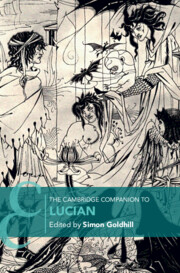Book contents
- Frontmatter
- Contents
- List of Figures and Tables
- List of Contributors
- 1 Introduction
- Part I
- Part II
- Part III
- 16 Lucian of Samosata in Renaissance Italy
- 17 Lucian Goes North: The Luciani Opuscula of Erasmus and Thomas More
- 18 From the Eighteenth to the Nineteenth Century: Voltaire, Leopardi, and a New Avenue of Philosophical Critique
- References
- Index Locorum
- Subject Index
- Cambridge Companions to Literature
16 - Lucian of Samosata in Renaissance Italy
from Part III
Published online by Cambridge University Press: 07 November 2024
- Frontmatter
- Contents
- List of Figures and Tables
- List of Contributors
- 1 Introduction
- Part I
- Part II
- Part III
- 16 Lucian of Samosata in Renaissance Italy
- 17 Lucian Goes North: The Luciani Opuscula of Erasmus and Thomas More
- 18 From the Eighteenth to the Nineteenth Century: Voltaire, Leopardi, and a New Avenue of Philosophical Critique
- References
- Index Locorum
- Subject Index
- Cambridge Companions to Literature
Summary
This chapter investigates the crucial significance of Lucian for early modern Italian literature and culture. From the late fourteenth century, Lucian’s writings were employed by Italian humanists to learn Greek and contributed considerably towards sparking a remarkable interest in the ancient Greek-speaking world. From Italy, Lucian’s fame travelled to the rest of Europe. During the fifteenth and sixteenth centuries, Lucian’s fictional dialogues and paradoxical encomia deeply informed the oeuvre of many prominent writers, among them Leon Battista Alberti, Erasmus of Rotterdam, and Lodovico Ariosto. Moreover, this study aims to shed light on the variety of different roles played by Lucian within the Renaissance. By taking into account unexplored matters, such as the impact of vernacular translations, it is possible to distinguish between a ‘didactic-moral’, a ‘useful and delightful’, and a ‘heterodox-heretical’ understanding of Lucian in early modern Italy. On the one hand, such differentiation allows to finesse the connections between the reception of his oeuvre and the political, cultural, as well as religious transformations of that time (e.g. the printing revolution and the Counter-Reformation). On the other hand, it shows that some features of Lucian’s poetics – especially humour, satire, and parrhesia – acted throughout the Renaissance as frameworks that influenced the early modern comprehension of fundamental issues, such as literary imitation and fictionality.
- Type
- Chapter
- Information
- The Cambridge Companion to Lucian , pp. 333 - 359Publisher: Cambridge University PressPrint publication year: 2024

